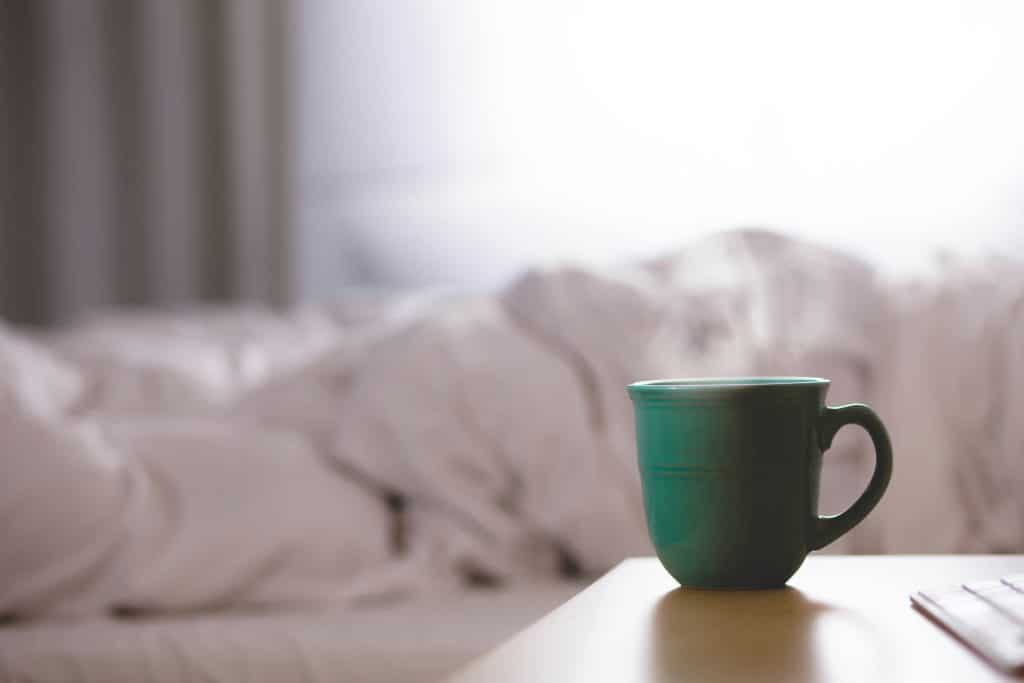You found our list of 10 tips for improving your sleep.
This list encompasses strategies and habits that contribute to a good night’s sleep. These recommendations enhance the quality and duration of sleep, thereby improving overall health and productivity. They are also known as “best sleep recommendations” and “effective sleep advice.”
These sleeping tips are similar to 7 Bedtime Rituals For Better Sleep.
This list includes:
- good ways to sleep
- advice for sleeping well
- good techniques to fall asleep
- ways to sleep well
- sleeping well
Let’s get to it!
List of ways to improve sleep
From maintaining regularity to keeping cool, here is our list of the best advice for sleeping well.
1. Maintain Regularity
Establishing a consistent bedtime and wake-up time is important for a healthy sleep routine. Following the same schedule each day regulates your body’s internal clock, making it easier to fall asleep and wake up naturally. Avoiding long naps and incorporating a calming pre-sleep routine such as reading or meditating can further enhance your sleep quality.
Consistency in sleep patterns also improves rest and benefits overall well-being by enhancing brain function and mood regulation. Prioritizing a regular sleep schedule is a simple yet effective way to feel more refreshed and alert throughout the day.
Making small changes like maintaining consistent bedtime hours can lead to more restful nights and feeling revitalized every morning.
Learn more about maintaining regularity.
2. Optimal Bedroom
Creating an ideal bedroom for sleep involves several important factors. First, make sure your room is dark and quiet to encourage deep rest. You might want to use blackout curtains or an eye mask to block out light and consider using earplugs or a white noise machine to reduce disturbances. Additionally, maintaining a cool temperature can improve sleep quality, so aim for between sixty and sixty-seven degrees Fahrenheit. Investing in a comfortable mattress and pillows that provide proper support for your body can also have a significant impact on the quality of your sleep each night.
Finally, keeping your space decluttered and tidy can contribute to a peaceful environment that encourages relaxation. By following these suggestions and arranging your bedroom with sleep in mind, you can optimize your sleeping area for improved rest and overall well-being.
Learn more about creating your optimal bedroom space.
3. Evening Beverages
Choosing the right evening drinks plays a crucial role. Calming herbal teas like chamomile or lavender can help relax the mind and body before bedtime. Avoiding caffeinated beverages such as coffee or energy drinks is wise, as they can interfere with your ability to fall asleep easily. Additionally, drinking warm milk or a soothing glass of decaffeinated tea can also promote relaxation and prepare you for a restful night’s sleep.By selecting your evening drinks mindfully, you can create a bedtime routine that supports quality rest.
Learn more about what drinks are best to incorporate into your nighttime routine.
4. Exercise Regularly
Regular exercise can significantly improve your sleep quality by reducing stress and anxiety, helping your body and mind relax. Physical activity triggers the release of endorphins, which boost mood and promote restful sleep. By establishing a habit of exercise, you enhance your health and create a healthy sleep routine.
Consistency is vital for experiencing the benefits of exercise on sleep. Experts suggest engaging in 150 minutes of moderate aerobic activity per week for best results. Whether you prefer jogging, yoga, or gym workouts, select activities that you enjoy to ensure long-term commitment. Investing time in physical fitness through regular exercise enhances sleep and boosts overall well-being.
By prioritizing regular physical activity, you can improve the duration and quality of your sleep each night.
Learn more about why we suggest exercising regularly.
5. Mind Relaxing Techniques
Taking part in mindfulness meditation, deep breathing exercises, or progressive muscle relaxation is effective in relaxing the mind and can improve the quality of sleep. Mindfulness meditation involves focusing on the present moment without judgment, which can reduce anxiety and promote relaxation. Deep breathing exercises help calm the mind and body by regulating the breath and reducing stress levels. Progressive muscle relaxation involves tensing and then relaxing different muscle groups to release physical tension and induce a state of calm. Individuals can experience better sleep hygiene and achieve a more restful night’s sleep by including these techniques in a bedtime routine.
Incorporating mind relaxing techniques into your nightly routine can significantly enhance your overall sleep quality, allowing you to wake up feeling refreshed and rejuvenated each morning. These practices not only promote relaxation but also help alleviate stress and anxiety, creating an environment conducive to restful sleep. Using these techniques consistently can establish healthy habits that contribute to improved well-being and mental clarity throughout the day.
Learn more about mind relaxing techniques.
6. Limiting Electronic Use
Eliminating electronics from your bedtime routine is important for good sleep quality. The blue light from screens can disturb your body’s natural sleep cycle, making it difficult to fall asleep. By avoiding electronics at least one hour before bedtime, you allow your brain to relax and get ready for sleep. Instead of using your phone or watching TV, consider reading a book or practicing relaxation techniques to tell your body it’s time to unwind for the night.
It may take some time to get used to this change, but the long-term benefits make it worthwhile. By prioritizing relaxation over screen use before bed, you are preparing yourself for a better and more rejuvenating night’s sleep.
Learn more about limiting electronic use.
7. Giving Yourself Time To Wind-Down
A wind-down routine before going to bed can greatly enhance the quality of your sleep. Wind-down time includes calming activities such as reading a book, taking a warm bath, or practicing relaxation techniques. These activities indicate to your body and mind that it is time to relax and get ready for sleep. By including wind-down time in your nightly routine, you can decrease stress and anxiety levels, making it simpler to fall asleep and remain asleep all through the night.
Strive to begin winding down at least an hour before your planned bedtime to allow yourself sufficient time to fully relax. Experiment with various wind-down activities to discover what works best for you and helps you unwind effectively. By prioritizing wind-down time, you can establish healthy sleep patterns that contribute to overall well-being and productivity during the day.
Learn more about wind-down time.
8. Consistent Bedtime Routine
Creating a consistent bedtime routine can greatly enhance the quality of your sleep. A bedtime routine helps communicate to your body that it is time to relax and get ready for rest. Activities such as reading a book, taking a warm bath, or practicing relaxation techniques can be part of this routine. These calming activities promote relaxation and aid in reducing stress levels, thus making it easier to drift off to sleep.
By consistently following a bedtime routine, you are teaching your body when it is time to relax and rejuvenate. Over time, this practice establishes healthy sleep habits, enhances sleep quality, and improves overall health.
Learn more about establishing a consistent bedtime routine.
9. Improve Bed Comfort
To enhance bed comfort, we suggest investing in high-quality bedding. This includes soft sheets with a high thread count to increase the luxurious feel against your skin. We also suggest adding a mattress topper for additional cushioning and support to promote a more peaceful night’s sleep. Supportive pillows that suit your preferred sleeping position to avoid neck and back pain are also important when trying to make your bed more ready for sleep.
By prioritizing quality bedding, you can significantly boost your bed comfort and enrich the quality of your nightly rest.
Learn more about how to make your bed more comfortable for sleep.
10. Keeping Cool
Making sure your bedroom is a comfortable environment can significantly affect the quality of your sleep. Most people find it best to sleep when the temperature is between sixty and sixty-seven degrees Fahrenheit. A cooler room helps your body regulate its temperature, leading to deeper and more restful sleep. Using a fan or air conditioning can help you maintain a comfortable sleeping temperature, especially in warmer months. Keep in mind that a cooler room can help you fall asleep faster and have fewer interruptions during the night.
By giving priority to a cool sleeping environment, you are improving your rest and overall well-being. A simple change like adjusting the room temperature can have a noticeable impact on your sleep quality.
Learn more about room temperature.
Final Thoughts On Improving Sleep
Improving your sleep is crucial for both mental and physical health. By integrating these tips into your daily routine, you can significantly enhance your sleep quality. Remember that consistency is key when it comes to developing good sleeping habits. Over time, these changes can lead to noticeable improvements in how you feel during the day.
Next, check out our post Your Perfect Summer Night Routine: Wind Down, Reset, and Sleep Well.








